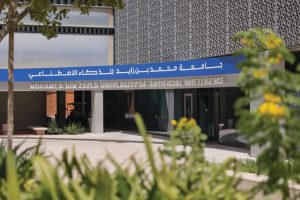ABU DHABI / WAM
The Mohamed bin Zayed University of Artificial Intelligence (MBZUAI) continues its research efforts to advance artificial intelligence (AI) and harness it as a global force that contributes to the progress and well-being of humanity.
With the knowledge and competence to continue the technology development process in the UAE and the world, MBZUAI is currently dedicating three key pillars of research — health, climate, and education.
MBZUAI is a research university that strives to establish and evolve interdisciplinary, collaborative research and development capabilities in AI, while educating students to be innovators and leaders with the breadth and depth of knowledge to grow technology and enterprise in the UAE and globally.
The university also has a vital role in many of the UAE Government’s strategic objectives, with AI identified as a critical component for future growth and prosperity. MBZUAI’s strategic vision and mission work in parallel to position Abu Dhabi as a hub for the international AI community.
In the following report, the Emirates News Agency (WAM) reviews MBZUAI’s most prominent research projects in the field of climate and its initiatives and partnerships with several global institutions that support efforts to achieve sustainability and climate neutrality.
MBZUAI AI operating system (AIOS) leads the movement to reduce the carbon footprint of AI computing itself. Current AI computing is extremely environmentally unfriendly.
For example, training GPT3 once can cost as much energy as the home electricity usage of a small city (150,000 homes), and millions of dollars.
MBZUAI aims to use the university’s AIOS technology to dramatically reduce the energy cost and time cost of AI computing by making models smaller, faster, and less reliant on high-end hardware, while also more performant and easier to adapt to changing environments and users.
MBZUAI partnered with IBM in January to launch an AI Centre of Excellence in Abu Dhabi.
The initiative is intended to advance collaboration to improve the adoption of AI technology and help drive sustainability. The centre will develop carbon-neutral solutions to existing energy supplies and combat climate change.
MBZUAI’s AIOS can also form the foundation of next-generation AI software production via automatic code generation, federated and collaborative machine learning, and standardised and certifiable software engineering, which will be used across industries such as energy, agriculture, water and food, and more, to advance logistic optimisation, predictive maintenance, adaptive operation, and precision management.
Experts from IBM and MBZUAI plan to focus on decarbonisation, with advanced research into climate change mitigation and adaptation. Joint research teams will work on the development of foundational AI models, which could help inform the deployment of clean and renewable energy in the electrification of multiple sectors across the economy. This approach will set the stage for the use of carbon-neutral solutions while also enabling adaptation and resiliency.
MBZUAI is also conducting research on AI models to improve the effectiveness of cloud seeding and AI systems to help predict extreme weather events, which are expected to become more frequent as the effects of climate change are felt.
A joint project under the partnership aims to provide a data engine to identify urban areas in Abu Dhabi with excessive heat, which could be used to inform climate and sustainability policies.
With its ability to analyse vast quantities of global data, AI can measure greenhouse gas emissions and climactic trends and spot potentially important patterns that will prove invaluable to scientists and policymakers.
A global collaboration between researchers at MBZUAI, UC Berkeley, CMU, Stanford, and UC San Diego set out to address the unsustainable costs of large language models (LLMs) with the creation of Vicuna — an open-source chatbot that cost US$300 to train and has a tiny carbon footprint compared to ChatGPT.
In another project, a team of researchers at MBZUAI, the University of British Columbia, and Monash University are working to drastically cut back on the electricity, water, and money required to train and use them and, in the process, deliver on the promise of LLMs. Not only that, the team aims to make LLMs far more secure.
Collectively, they have created LaMini-LM — a collection of language models that they want to deploy in resource-deprived scenarios such as consumer laptops and mobile devices. This would virtually eliminate security concerns while allowing institutions of all sizes to deploy the power of an LLM on their home network or devices in a relatively efficient manner.
LaMini-LM is a collection of small-sized, efficient language models distilled from ChatGPT and trained on a large-scale dataset of 2.58M instructions. The team developed LaMini-LM by distilling knowledge from ChatGPT, similar to how a teacher passes on a condensed version of their knowledge to students.
 The Gulf Time Newspaper One of the finest business newspapers in the UAE brought to you by our professional writers and editors.
The Gulf Time Newspaper One of the finest business newspapers in the UAE brought to you by our professional writers and editors.
